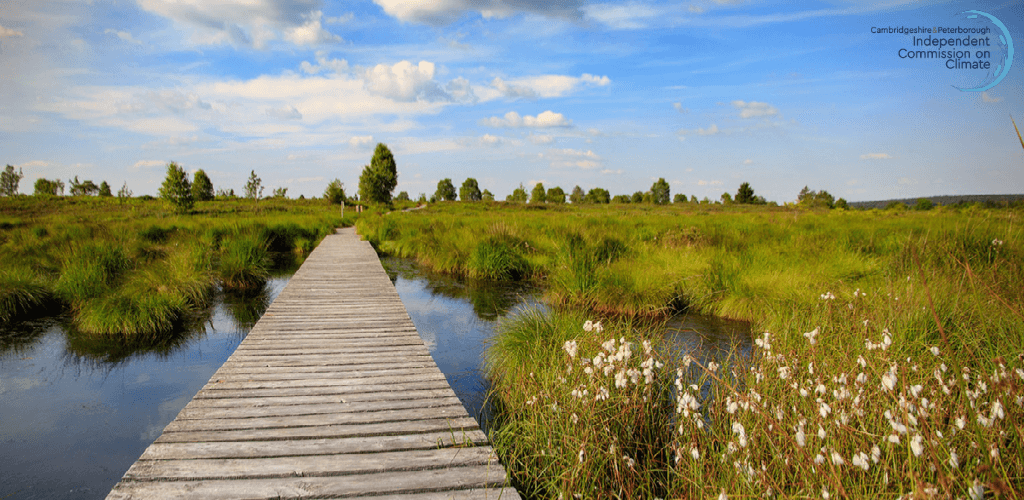
Urgent need for action to tackle climate change and its impact on Cambridgeshire and Peterborough
In a report on their initial recommendations, published today (15 March), the Cambridgeshire & Peterborough Independent Commission on Climate outlines the key risks this region faces. These include flooding, high summer temperatures, water shortages, and damage to the natural carbon stores in the deep peat of the Fens. The report raises the urgent need to reduce regional greenhouse gas emissions which are approximately 25% higher per person than the UK average, and warns that the regions ‘allowed’ share of emissions to 2050 could be exhausted within as little as six years if no action is taken.
The Independent Commission, which was originally commissioned by James Palmer, Mayor of Cambridgeshire and Peterborough acknowledges that the scale of the task ahead is huge and will require significant investment. The Commission emphasises both the need to get on track to reduce emissions in line with UK targets and to prepare for the impacts of climate change that are already happening, stressing the need for fairness to be at the core to the approach. The report sets out over 30 recommendations for action including in relation to reducing transport emissions and making homes more energy efficient.
The report also highlights the immense opportunity that tackling climate change can bring. This includes more and better green space, a thriving natural world, better insulated and better ventilated homes, cleaner air, high quality job opportunities in the growing green economy, better public transport, improved health and well-being, and many others.
Baroness Brown, Chair of the Independent Commission on Climate said:
“Emissions in our area are higher than the national average. We also face high risks from the changing climate – in relation to rising summer temperatures, water shortages and flooding. Urgent action is necessary – both to play our part in delivering the UK’s ambition to achieve net zero emissions by 2050, and to prepare for the impacts of climate change. It is a big task. But we have the resources – in our businesses, farming communities, academic and research institutes – and most importantly our people, to rise to that challenge and become an exemplar for the rest of the country”.
This report, one of two due to be published from the Independent Commission on Climate this year, focuses on the first four key areas of transport, buildings, energy and peat. It makes recommendations to central government to clarify how transition costs will be met, provide more power to local authorities to require higher standards in planning, building and transport, and devolve more responsibility and funding to deliver transport and building decarbonisation.
At the same time, it emphasises the importance of action and the leadership roles the Combined Authority, local government and businesses can take. It is clear that local communities, businesses, and residents all need to work together to make the changes that are needed at the speed required.
A summary of the key recommendation includes making all Combined Authority and Local Authority operations net zero by 2030,
James Palmer, Mayor of Cambridgeshire and Peterborough said:
“I’d like to thank Baroness Brown and all the member of the Climate Change Commission for their hard work in preparing this report. I was determined to ensure our response to climate change in Cambridgeshire and Peterborough was grounded in the evidence and real-world considerations, and the Commission have not let me down.
“We will digest the full report over the coming days and weeks and look at how we can apply their findings to the important work we are doing in delivering economic growth for Cambridgeshire and Peterborough.”
The final report from the Independent Commission on Climate to be published later this year, will pick up other important areas including waste, water, business and industry, requirements for a just transition, and the role of nature in helping us to adapt and mitigate the impacts of climate change; and will consider further requirements for public engagement.
- Five targeted skills projects backed to tackle further education ‘cold spots’ and benefit 9,400 learners
- Paul Bristow statement: English Devolution and Community Empowerment Bill
- Milestone for ARU Peterborough as first graduates set for celebration
- Mayor Paul Bristow statement in response to Government announcement of funding for 50 road and rail upgrade projects
- March’s Broad Street Improvements Shortlisted For National Transport Award
- Independent review set for bus franchising in Cambridgeshire and Peterborough

